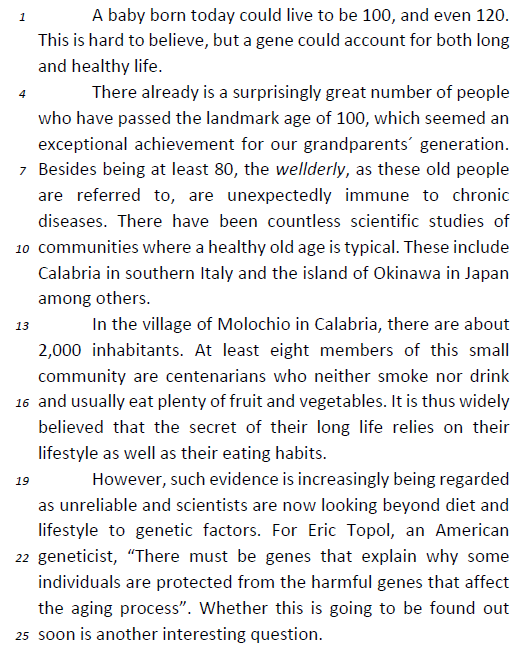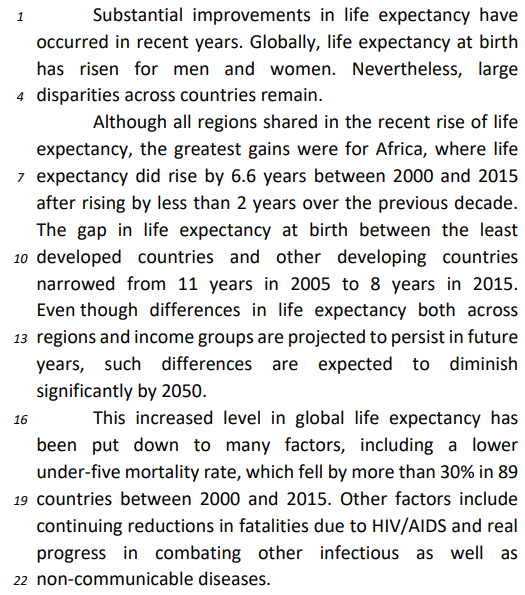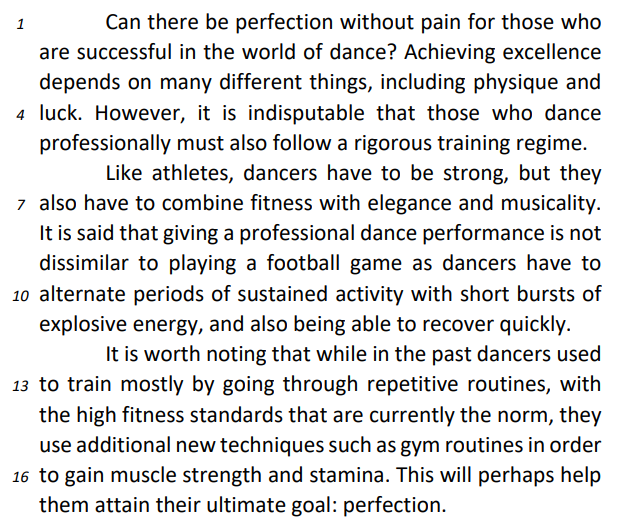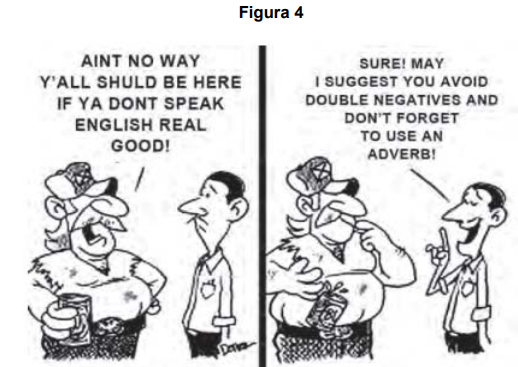Questões de Concurso
Sobre aspectos linguísticos | linguistic aspects em inglês
Foram encontradas 798 questões
“When Louise had gone to her own room, I washed, changed into a white frock with a wide blue belt, and did my face and hair very slowly.”
In the sentence above, we can find many modifiers. Mark the alternative that does NOT represent a modifier in this context.
Leia as afirmativas a seguir:
I. Está correta a grafia do trecho a seguir, em inglês: it is like enough (é muito provável).
II. Está correta a grafia do trecho a seguir, em inglês: to take leave (despedir-se, partir).
Marque a alternativa CORRETA:
Leia as afirmativas a seguir:
I. Estão corretas a grafia e a tradução do seguinte trecho, em inglês: make it known (torne público).
II. Estão corretas a grafia e a tradução do seguinte trecho, em inglês: to keep silence (ficar calado).
Marque a alternativa CORRETA:
Leia as afirmativas a seguir:
I. Está correta a grafia do trecho a seguir, em inglês: by your leave (com sua licença).
II. Está correta a grafia do trecho a seguir: he brougiht down the house.
Marque a alternativa CORRETA:
Leia as afirmativas a seguir:
I. Está correta a grafia do trecho a seguir: he made a clean breast of it.
II. Está correta a grafia do trecho a seguir, em inglês: do not shout like that (não grite tanto).
Marque a alternativa CORRETA:
Leia as afirmativas a seguir:
I. Na frase “he eats him out of house and home”, o verbo 'eats' pode ser melhor traduzido como reformar.
II. O trecho a seguir, em inglês, está corretamente grafado: to have im kypimg (guardar, custodiar).
Marque a alternativa CORRETA:
Leia as afirmativas a seguir:
I. Estão corretas a grafia e a tradução do seguinte trecho, em inglês: to take leave (despedir-se, partir).
II. Estão corretas a grafia e a tradução do seguinte trecho, em inglês: to keep smiling (não desanimar, sorrir sempre).
Marque a alternativa CORRETA:
Leia as afirmativas a seguir:
I. Está correta a grafia do trecho a seguir: I bought hin of.
II. No trecho "to be crawling with" ocorre um verbo cujo significado é "gerenciar" ou "comandar".
Marque a alternativa CORRETA:
Text for the item.
A long and healthy life?

Internet: <www.ngllife.com> (adapted).
Based on the text, judge the following item.
80 years is not a correct alternative for “80” in “at least
80” (line 7).
Text for the question.
Higher life expectancy worldwide

Text for the question.
Higher life expectancy worldwide

Text for the question.
The route to perfection

Text for the question.
The route to perfection


DONAR. Disponível em: <http://politicalgraffiti.wordpress.com>. Acesso em: 17 ago. 2011.
Considerando a relação entre linguagem e sociedade, analise o diálogo presente na charge (figura 4)
e assinale a alternativa que está em consonância com o que é descrito nos PCN de Língua Inglesa
sobre este tópico.
TEXT 7
“This, then, is the site of resistance, change, adaptation and reformulation. It is akin to what Canagarajah (1999) in his discussion of resistance to the global spread of English describes as a ‘resistance perspective’, highlighting the ways in which postcolonial subjects ‘may find ways to negotiate, alter and oppose political structures, and reconstruct their languages, cultures and identities to their advantage. The intention is not to reject English, but to reconstitute it in more inclusive, ethical and democratic terms.”
PENNYCOOK, A. Global Englishes and Transcultural Flows. New York: Routledge, 2007, p. 29.
The sentence that best preserves the meaning of the following excerpt “The intention is not to reject English,
but to reconstitute it.” is:
TEXT 5
“In other words, there are those among us who argue that the future of English is dependent on the likelihood or otherwise of the U.S. continuing to play its hegemonic role in world affairs. Since that possibility seems uncertain to many, especially in view of the much-talked-of ascendancy of emergent economies, many are of the opinion that English will soon lose much of its current glitter and cease to be what it is today, namely a world language. And there are those amongst us who further speculate that, in fifty or a hundred years’ time, we will all have acquired fluency in, say, Mandarin, or, if we haven’t, will be longing to learn it. […] Consider the following argument: a language such as English can only be claimed to have attained an international status to the very extent it has ceased to be national, i.e., the exclusive property of this or that nation in particular (Widdowson). In other words, the U.K. or the U.S.A. or whosoever cannot have it both ways. If they do concede that English is today a world language, then it only behooves them to also recognize that it is not their exclusive property, as painful as this might indeed turn out to be. In other words, it is part of the price they have to pay for seeing their language elevated to the status of a world language. Now, the key word here is “elevated”. It is precisely in the process of getting elevated to a world status that English or what I insist on referring to as the “World English” goes through a process of metamorphosis.”
RAJAGOPALAN, K. The identity of "World English”. New Challenges in Language and Literature. Belo Horizonte: FALE/UFMG, 2009, p. 99-100.
Ellipsis and substitution can be used as resources for avoiding repetition.
There are examples of ellipsis and substitution in the excerpt “And there are those amongst us who further speculate that, in fifty or a hundred years’ time, we will all have acquired fluency in, say, Mandarin, or, if we haven’t, will be longing to learn it.”.
Mark the alternative that contains an example of ellipsis only.
TEXT 4
“It must be fairly obvious from the discussion in the foregoing paragraphs that the very concept of ‘World Englishes’ throws a number of challenges at all those of us who are in one way or another involved in it. For ELT professionals all over the world, it means, among other things, having to take a fresh look at many of the things that have been taken for granted for long.
Consider, for instance, the following. World English is not the mother-tongue of anyone – and this includes even those who used to rejoice in their status as the ‘native-speakers’ of their own varieties of English. This is so because World English is a language that is in the making and, from the looks of it is bound to remain so for the foreseeable future. Incidentally, any temptation to consider World English a pidgin would be totally misguided in that it is not a make-shift language, nor one that is progressing towards a full-fledged language in its own right. Nor, for that matter, is it gathering a new generation of native speakers. Rather, it is resistant to the very terminology that the linguists resort to in describing conventional ‘natural’ languages.”
RAJAGOPALAN, K. The identity of "World English”: New Challenges in Language and Literature. Belo Horizonte: FALE/UFMG, 2009, p.104.

Leia a tira em quadrinhos e analise as afirmativas abaixo.

I. No primeiro quadrinho Hagar consultou o velho sábio para saber sobre o segredo da felicidade.
II. No segundo quadrinho as palavras that e me se referem, respectivamente, ao “velho sábio” e a “Hagar”.
III. As palavras do velho sábio no último quadrinho são de que é melhor dar que receber.
Assinale a alternativa correta.